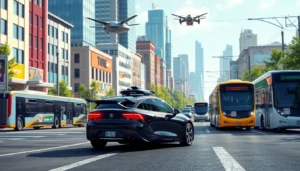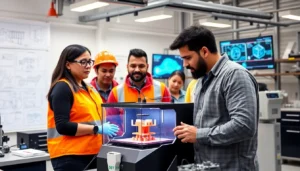Table of Contents
ToggleIn a world where robots might soon be more reliable than your morning coffee, AI emerging technologies are taking center stage. From self-driving cars to chatbots that might just outsmart your average human, these innovations are reshaping the way we live, work, and maybe even argue about the best pizza toppings.
Overview of AI Emerging Technologies
AI technologies continue to evolve, bringing significant changes to modern life. Innovations like machine learning and natural language processing enhance user interactions, powering applications that understand human intent. Computer vision is another vital component, enabling devices to interpret visual data, such as images and videos, transforming industries like healthcare and automotive.
Robotic process automation (RPA) streamlines routine tasks, minimizing human intervention in repetitive jobs. Self-driving vehicles utilize AI algorithms to navigate roads, aiming for improved safety and efficiency. Voice assistants integrate speech recognition technologies, allowing seamless communication between users and devices.
Big data analytics complements AI’s capabilities, offering insights from vast amounts of information, thereby driving informed decision-making. IoT devices collect real-time data, enabling smarter environments through automation and monitoring. Quantum computing pushes computational boundaries, promising complex problem-solving methods previously thought impossible.
Generative AI captures attention with its ability to create content, from art to written text, showcasing boundless creativity. AI ethics emerges as a crucial consideration, advocating for responsible development and integration of these technologies. Privacy concerns and bias mitigation play significant roles in shaping guidelines for responsible AI use.
As advancements continue, collaboration among sectors is essential for harnessing AI’s potential while addressing its challenges. The synergistic relationship between AI and other technologies fosters innovation, setting the stage for unprecedented growth and improvement across various fields.
Key Areas of Development
AI technologies have advanced significantly, focusing on several key areas that drive innovation and efficiency across multiple fields.
Natural Language Processing
Natural language processing (NLP) allows machines to understand and generate human language. Algorithms analyze text, enabling applications like sentiment analysis and chatbots. Companies utilize NLP to enhance customer service by providing instant responses. Advanced models, such as transformers, interpret context better and generate more relevant responses. Integration of NLP in voice assistants enables seamless communication and support. Businesses benefit from optimizing content marketing strategies by analyzing consumer behavior through text data insights.
Computer Vision
Computer vision involves teaching machines to interpret and understand visual information. Cameras and sensors capture images, while algorithms identify objects, faces, and activities. Industries apply computer vision for quality control in manufacturing and security monitoring. Autonomous vehicles rely on vision systems to navigate environments safely. Retailers use facial recognition technology for personalized shopping experiences. Enhanced data extraction capabilities enable organizations to derive meaningful insights from images and videos.
Robotics
Robotics combines AI with physical machines to automate tasks. Robots operate in environments ranging from factories to healthcare facilities. Their ability to perform repetitive, labor-intensive tasks increases operational efficiency. Advanced robotic systems collaborate with humans to improve productivity. Surgical robots assist in precision operations, enhancing patient outcomes. Delivery drones move goods swiftly, demonstrating robotics’ potential in logistics and transportation. Continuous innovation in robotics streamlines processes and enhances service delivery across sectors.
Impact on Industries
AI and emerging technologies are reshaping industries, introducing new efficiencies and capabilities.
Healthcare
Healthcare is experiencing groundbreaking changes through AI technologies. Enhanced diagnostics powered by machine learning lead to earlier disease detection. Predictive analytics provide insights for patient outcomes, improving treatment plans. Telemedicine, utilizing AI interfaces, offers remote consultations with specialized practitioners. Robotics assist in surgical procedures, increasing precision and reducing recovery times. AI chatbots manage patient queries, streamlining communication in busy healthcare settings. These advancements ultimately foster a shift toward personalized medicine, with data-driven approaches tailoring treatments to individual needs.
Finance
The finance sector benefits significantly from AI integration. Automated trading systems analyze market trends, executing trades with minimal human intervention. Fraud detection algorithms identify unusual activity in real-time, safeguarding customers’ assets. Customer service enhancement occurs through AI-driven chatbots, addressing inquiries efficiently. Additionally, portfolio management utilizes predictive modeling to personalize investment strategies. Regulatory compliance becomes more manageable with AI tools that automate documentation and analysis. Overall, these innovations transform financial services, creating more secure and personalized experiences for clients.
Transportation
Transportation undergoes a revolutionary transformation with AI applications. Autonomous vehicles navigate roads, using sensors and machine learning to analyze environments. Traffic management systems optimize routing, reducing congestion and travel times. AI-powered logistics improve supply chain efficiency by predicting demand fluctuations. Public transportation systems benefit from real-time data analysis, enhancing service reliability. Ride-sharing platforms leverage AI to match users with drivers, ensuring efficient service delivery. Such advancements not only elevate safety but also contribute to sustainability efforts in the transportation sector.
Challenges and Ethical Considerations
AI technologies raise significant challenges and ethical concerns. Addressing these factors ensures responsible development and implementation.
Data Privacy
Data privacy emerges as a critical issue in AI applications. Many AI systems rely on vast amounts of personal data to function effectively, which raises questions about who has access to this information. Organizations must prioritize user consent and transparent data usage policies. The risk of data breaches can compromise sensitive information, leading to potential misuse. Regulatory frameworks, such as the GDPR, mandate strict guidelines to protect user data. Compliance with these regulations fosters trust between users and AI providers, making informed data handling essential.
Job Displacement
Job displacement represents another pressing challenge posed by AI technologies. Automation may streamline processes but it can also lead to significant workforce reduction across various industries. Certain roles, particularly in manufacturing and administrative sectors, may see higher levels of redundancy due to AI efficiencies. Reskilling and upskilling initiatives become essential to prepare the workforce for new job opportunities within an AI-enhanced landscape. Employers must invest in training programs that equip employees with relevant skills. Addressing these shifts helps create a more adaptable workforce ready to navigate technological changes.
Future Trends in AI Emerging Technologies
Innovations in AI emerging technologies continue to redefine various sectors. Advancements in machine learning promise to enhance predictive analytics, allowing organizations to make data-driven decisions. Natural language processing developments are expected to improve human-computer interaction, facilitating smoother communication.
Growth in computer vision technology contributes to safer and more efficient applications in security and retail. Robotics integration with AI can automate complex tasks, thus increasing productivity across industries. Autonomous systems are likely to revolutionize transportation, influencing logistics and urban planning.
The emergence of quantum computing may elevate AI processing capabilities, enabling more complex problem-solving at unprecedented speeds. Generative AI tools are set to transform creative industries, enabling the rapid production of personalized content. Ethical considerations in AI are gaining more importance; privacy concerns and bias mitigation strategies will need to be prioritized as technologies evolve.
AI’s impact on healthcare continues to deepen, with predictive models improving diagnostics and treatment plans. Telemedicine services are expanding, driven by advancements in AI-driven communication tools. The finance sector increasingly relies on AI for real-time analytics, enhancing security and customer experiences.
Overall, collaboration among industries is critical in harnessing AI’s transformative potential. Stakeholders from technology, healthcare, and finance must work together to establish best practices and standards. As these trends unfold, the future of AI emerging technologies appears poised to create new efficiencies and capabilities that will reshape everyday life.
AI and emerging technologies are set to redefine modern existence in unprecedented ways. As advancements continue to unfold they promise to enhance efficiency across various sectors while addressing critical challenges like data privacy and job displacement.
The collaboration between industries will be vital in navigating the complexities of this technological landscape. By prioritizing ethical considerations and fostering innovation, society can harness the full potential of AI.
The future is bright as these technologies evolve and integrate deeper into everyday life, paving the way for smarter solutions and transformative experiences.







